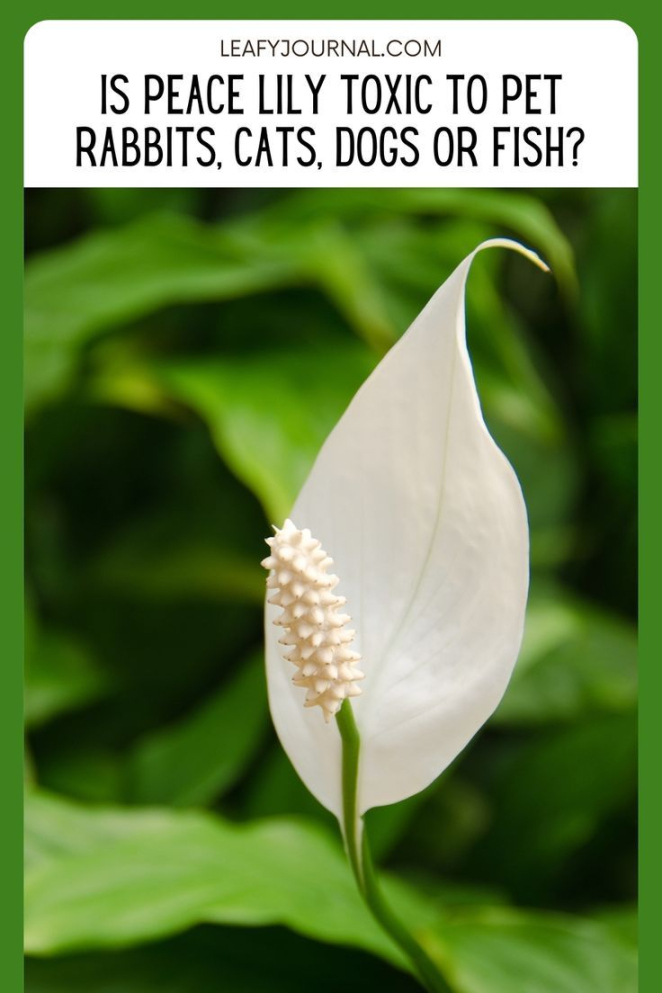Is Peace Lily Toxic to Rabbits?
Rabbits are curious creatures, and as pet owners, it is important for us to be aware of the potential dangers that certain plants may pose to our furry friends. One such plant that might catch your attention is the peace lily. Known for its beautiful white flowers and lush foliage, peace lilies are commonly found in households and offices. However, if you have a rabbit as a pet, you might be wondering whether the peace lily is toxic to them.

1. Toxicity of Peace Lily to Rabbits
The peace lily (Spathiphyllum) contains calcium oxalate crystals, which can cause significant discomfort to rabbits if ingested. These crystals can irritate the mucous membranes, resulting in symptoms such as excessive drooling, difficulty swallowing, vomiting, and diarrhea. In severe cases, it can even lead to respiratory distress.
2. Symptoms of Peace Lily Toxicity
If your rabbit has come into contact with or ingested parts of a peace lily, you should watch out for the following symptoms:
- Excessive drooling
- Difficulty swallowing
- Vomiting
- Diarrhea
- Labored breathing or respiratory distress
- Swollen or red oral tissues
3. Immediate Steps to Take
If you suspect that your rabbit has been exposed to peace lily toxicity, it is crucial to take immediate action:
- Remove your rabbit from the vicinity of the peace lily to prevent further exposure.
- Rinse your rabbit’s mouth with water to remove any remaining plant residue.
- Offer water to help flush out any toxins that may have been ingested.
- Contact your veterinarian for further guidance and advice.
4. Treatment for Peace Lily Toxicity
If your rabbit is showing symptoms of peace lily poisoning, it is essential to seek veterinary care promptly. The veterinarian may perform a thorough examination of your rabbit and administer appropriate treatment, which may include:
- Flushing the mouth with water or a mild saline solution to remove any remaining plant material.
- Providing intravenous fluids to keep your rabbit hydrated and flush out toxins.
- Administering medication to alleviate discomfort or reduce inflammation.
- Monitoring your rabbit closely for any respiratory distress or other complications.
Quick action and prompt veterinary care are crucial in cases of peace lily toxicity to ensure the best chances of a full recovery for your rabbit.
Frequently Asked Questions (FAQs)
Can rabbits safely chew on peace lily leaves?
No, peace lily leaves should not be consumed by rabbits. The calcium oxalate crystals present in the leaves can irritate their mucous membranes and potentially cause severe discomfort or health issues.
Are peace lilies toxic to other pets, such as cats or dogs?
Yes, peace lilies are also toxic to cats and dogs. The same calcium oxalate crystals that can harm rabbits can cause similar adverse effects in other animals if ingested.
What are some safe alternatives to peace lilies for indoor plants?
There are many pet-friendly options for indoor plants, including spider plants, Boston ferns, and African violets. It’s always a good idea to research and ensure the plants you choose are safe for your specific pets.
How can I keep my rabbit safe from toxic plants?
Preventing access to toxic plants is the best way to keep your rabbit safe. Place plants out of reach, fence off areas with dangerous plants, and provide your rabbit with plenty of safe chew toys and grass to satisfy their natural chewing instincts.
Related Articles…
Copyright Notice:
The images displayed here are sourced from the internet, with copyrights held by respective owners. For removal of any copyrighted image, please email us.